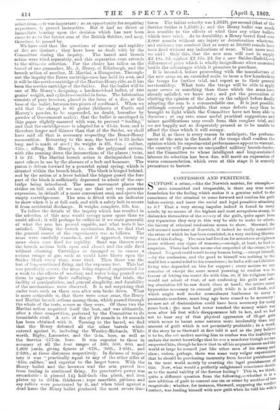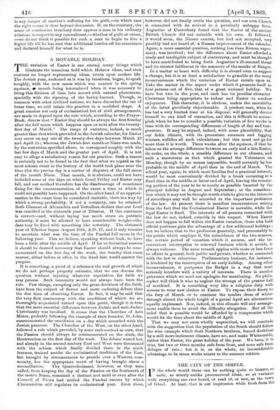CONFESSION AND PENITENCE.
SUPPOSE a crime,—like the Norwich murder, for example,— once committed and irreparable, is there any true moral foundation for the feeling which makes it a genuine relief to the conscience of the crituival to come forward and confess his guilt before society, and incur the social and legal penalties attaching to it ? That a very strong impulse indeed is found in many minds, by no means of the highest and most scrupulous stamp, to disburden themselves of the secrecy of the guilt, quite apart from any reparation they may in this way be able to make to others, the history of criminal confessions seems to show. Sheward, the self-accused murderer of Norwich, if indeed he really committed the crime of which he has been convicted, is a very striking illustration of this feeling. The man had lived on for seventeen or eighteen years without any signs of remorse,—enough, at least, to lead to suspicion. There had been no one else suspected of the crime, to be cleared. No good could result to any human being, —except himself, —by the confession, and the good to himself was nothing in the world but a moral relief to his conscience ; he had a wife and children living who depended on him for support ; every motive we can conceive of except the mere moral yearning to confess was is favour of letting the secret die with him, or, if his religious fears would not admit of that, of not confessing his guilt and asking absolution till he saw death close at hand ; the active moral hypocrisies necessary to conceal guilt while it is still fresh, and which might well render concealment loathsome to many a passionate murderer, must long ago have ceased to be necessary no new act of dissimulation could have been necessary for many years back ; the man had never touched the money which was soon after hi; first wife's disappearance left to her, and so had not to bear any of that physical oppression of ill-got gain which seems to haunt some natures more intolerably than any amount of guilt which is not pecuniarily profitable ; in a word, if the story be as Sheward at first told it and as the jury believe it to be, the sole motive moving him to confess was the inability to endure the secret knowledge that he was a murderer though no one suspected him, though he knew that to all his acquaintances and the world at large he seemed just like other men of his stamp and class ; unless, perhaps, there was some very vulgar superstition that he should be purchasing immunity from heavier punishments in the next world merely by courting the legal punishments of this. Now, what would a perfectly enlightened conscience decide as to the moral validity of the former feeling? This is, we think, quite a different question from the following,—whether it is a new addition of guilt to conceal one sin or crime by another of lea magnitude; whether, for instance, Sheward, supposing the verdict correct, was loading himself with new guilt when he told his wife's sister that he had done nothing with her sister, but that she had gone away and left him penniless. That is, of course, adding guilt to guilt. But what we want to determine is rather this,—whether there is moral validity in the feeling which prompts men to confess a past crime, even though its concealment involves nothing more than mere silence, and does not demand any fresh hypocrisy or falsehood to support it. And if it is a true moral feeling, how far does it go? Would it be limited to confessing mere legal crime and bearing mere legal punishment? If there is any true moral authority in the feeling, would a man who had been guilty, not of a crime, but of a very mean and immoral action that was not criminal, but the general knowledge of which would rob him of the regard and respect of all for whom he most cared, be equally bound to declare himself what be was, and bear the disgust and condemnation be would be sure to meet? In a word, if confession be in any degree an act of reparation in itself,—apart from any -consequences which might ensue to others,—where does the moral obligation stop? Is a man to be conscious of nothing for which be hates himself, and which yet he would not willingly let others know ? If that would be a morbid and exaggerated view, where are we to draw the line? At the time of his confession Sheward was certainly inflicting no fresh injury on any human being by his silence as to his crime, and was likely to hurt his family's prospects by disclosing it. Where, then, should we find the precise stress of the moral obligation, if we admit it at all ? Evidently the obligation we are discussing goes much farther than that which sacerdotal churches enforce as the condition of absolution, for that is a mere private confession, given under a seal so sacred that the priest is bound never to reveal it, and it is rendered obligatory apparently chiefly in order to give the priest full insight into the sinner's mind, so as to enable him to probe the sincerity -of its penitence. That public confession which subjects a man to the full penalty and disgrace which, but for this, he would have escaped, is a very different matter. The severest priest would hardly impose it as a penance on his penitent, even though
• the penitent himself suggested it, and expressed his desire to do that or anything else which would best avail to purify
is soul. Unless, of course, confession were necessary to clear another, or—ut least—were essential to complete restitution, no priest would, in all probability, counsel, much less impose it. Can we, then, assert that, supposing Sheward's public confession to have been true, he was in any sense morally bound to make it, —that that was the highest course open to him if truly penitent ? that he could not have shown true penitence in any equally -efficient way? Is it not conceivable that a better nature in the same position might have reasoned thus?—' It is true my mind is laden with a burden of guilt which it might be some sort of physical relief to me to compel the violated laws of the country to deal with ; I should find a certain weight of oppression lifted off me if everybody knew me for what I am ; my mind would be more at ease ; I should feel no longer the sense of hypocrisy, of ecting, which I cannot help feeling while I am compelled to think of myself so differently from what others think ; but, in spite of all this, I have now taken new obligations on me, and this confession, if I make it, would be a blow to my wife and children such as they will scarcely ever get over ; not only should I be unable to support them, but their name will be blighted by association with my guilt ; it would then be a life of truer penitence, if I were not to give myself this relief, but to bear about my dreadful secret to the grave, and in the mean time devote myself to any duties, however humiliating and painful, by which God may suggest to me to cleanse my soul from the stains it has incurred, and bring me back to comparative peace.' That penitent criminals -might feel this aide of the case very strongly, few, we think, will doubt. But which of the two would really represent the truer and more penitent condition of mind in the criminal, the resolve to rid himself of the horrible secret and seem to others once more what he was,—or the resolve to bear it for the sake of others, and win forgiveness, if he could, by an inward change of life ? A modern author, in a tale of great power, Paul Ferroll, has _put this moral problem with very great force, but has not offered any solution. Some of our readers may remember that Paul Ferroll has been deeply injured by the woman who becomes his Wile, that she has cheated him in order to break off his engagement to the woman be really loved with all his heart, and to get him to marry her instead. The deception rankles in him. He makes up his mind to kill his wife, whom he hates, but togive himself up rather than let any one else suffer for the murder, lie accomplishes his purpose with the greatest coolness and science. rhe murderer is not discovered. He then offers to and marries the object of his love, but shuts himself out from all society, dis couraging anything like friendship from his county neighbours, and living wholly for his wife, and afterwards his daughter. He tries to expiate his deed by the most benevolent activity daring a fearful outbreak of cholera, exposing his life in a hundred ways in order to save the poor and alleviate the sufferings of the victims. But he does not take the infection, and the one terrible suffering of his life is delineated as being, not remorse, but the terrible feeling that his wife, and in a less degree his daughter, who idolize him, are loving, not himself, but an imaginary husband and father, and that they would shrink from the real husband and father if they once knew what was in his soul. When, at last, a servant who had robbed his first wife of some trifling trinkets is accused of the murder and convicted, Paul Ferroll gives himself in charge for the crime, and appeals to evidence deposited by him in the coffin just before it was closed. The shock kills his wife ; he escapes from jail, and with his daughter flies to America, where he is devotlkIly tended by her, and he is supposed to die penitent. But the anther contributes nothing to the decision whether or not Paul Ferroll's secrecy involved an iucreased and prolonged guilt, before it endangered any other person, except only the delineation of the constant and terrible sense of falsehood which beset him in his relations with his wife, and the sort of reaction which made him strive to throw himself passionately into momentary enjoyments of the beauty and fragrance of life, as it passed, without listening to the inner doubts of his heart. Perhaps the true decision as to such a case as this imaginary one might be that lie should have confided the truth to his wife and daughter, even at the certain cost of their peace of mind if not of their health and life, rather than live with them the false life he did, while all their relations were grounded on the assumption of real, deep, inward knowledge of each other. Paul Ferroll might, no doubt, have argued that these delicate women would have attached a perfectly superstitious value to this one bloody act of an otherwise stainless life, and that they would have known him less truly had he confessed, than they did while he concealed it. But that, of course, would have been pure sophistry. That a man who could put a faulty, or, if you please, guilty wife out of the way in this offhand manner, was profoundly different from what his worshipping wife and daughter had conceived him, there was, we suppose, little doubt. lie might have left to them to find out that such a deed was not inconsistent with all the tenderer nature they had given him credit for; and beneath whatever weight of suffering, they would have found it out. We feel sure that no man has a right to live in these innermost relations with any one, under a conscious disguise which he knows to be vital, and will not remove. But we do not feel clear that Paul Ferroll owed confession to any one outside that inmost circle, —though he was clearly bound to discourage, as he did, all those relations of intimacy which, if once they had grown up, would have put him in a false inward relation with others also. Living the life of isolation he did, we can only feel clear that the disguise from his wife and daughter must have been, if the story were true, a fresh daily addition of guilt to the old burden of guilt. In proportion as the relation of one person to another becomes truly intimate, approaches one of soul to soul, the guilt of suppressing a whole world of unacknowledged hidden life of the most material kind seems to us to become more and more clear.
How far considerations of this kind could apply to a case like Sheward's it is by no means easy to say. There are too many marriages which never involve any sort of intimate relation at all between husband and wife, plenty of families in which the relation of father to child is the most external and vulgar in the world. Nothing that has come out about Sheward, except his confession, would seem to give any indication of a vivid inward life at all. At the same time, it may be said that a commoner and less sensitive type of mind might attach as much importance to the falsehood of a mere external reputation as more sensitive minds would to the falsehood of an inward relation. To some extent it is true that those who realize fully how very little the ordinary world knows of any one, are less conscious of owing anything to the ordinary world than those who have never realized this adequately. A Paul Ferroll might feel quite easy as to having a false reputation with the common world, knowing clearly, as he would, how very ignorant it is of the heart of any man, where a Sbeward might feel guilty of real treachery in the matter. All that it is easy to decide is this,—that wherever the sense of continuous treachery is added to the guilt of a secret crime, that guilt is clearly and greatly increased. If that sense does not make itself felt, as it hardly would in such a man as Paul Ferroll, except in the most intimate relations, then it is only in those intimate relations that such a one owes to his own conscience a confession to another,—except, of course, there is any danger of another's suffering for his guilt,—in which case the right course is clear beyond discussion. If, on the contrary, the sense of continuous treachery does oppress a man in his ordinary relations in respect to any concealment,—whether of guilt or crime, —we do not think it possible for such a man to begin to live a higher life till he has cast that additional burden off his conscience and declared himself for what he is.




































 Previous page
Previous page